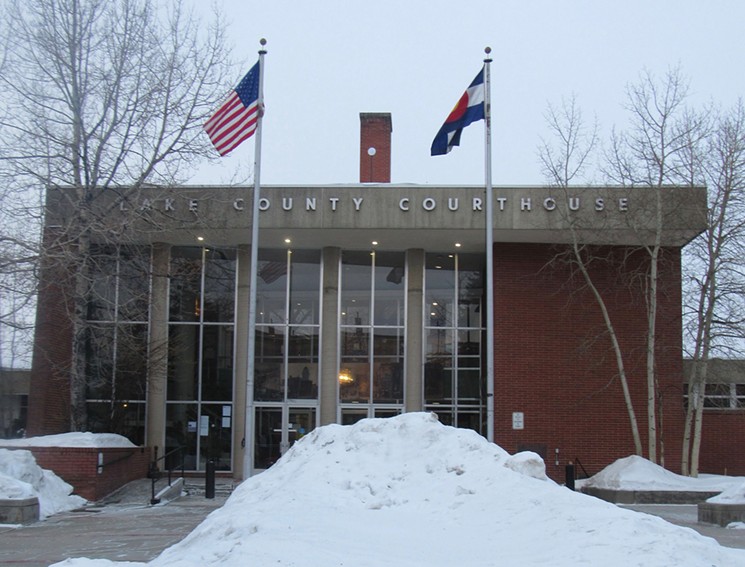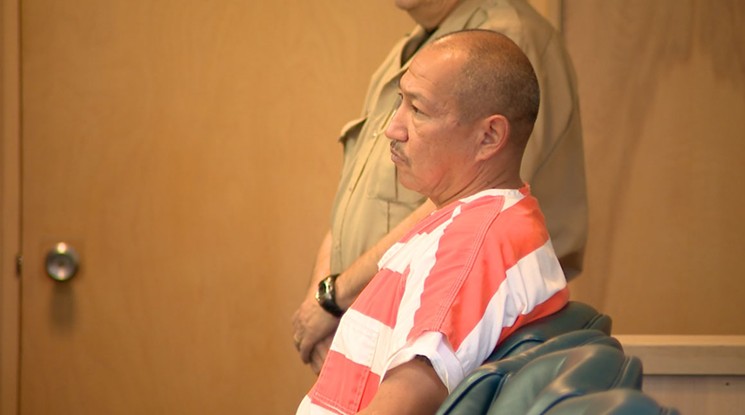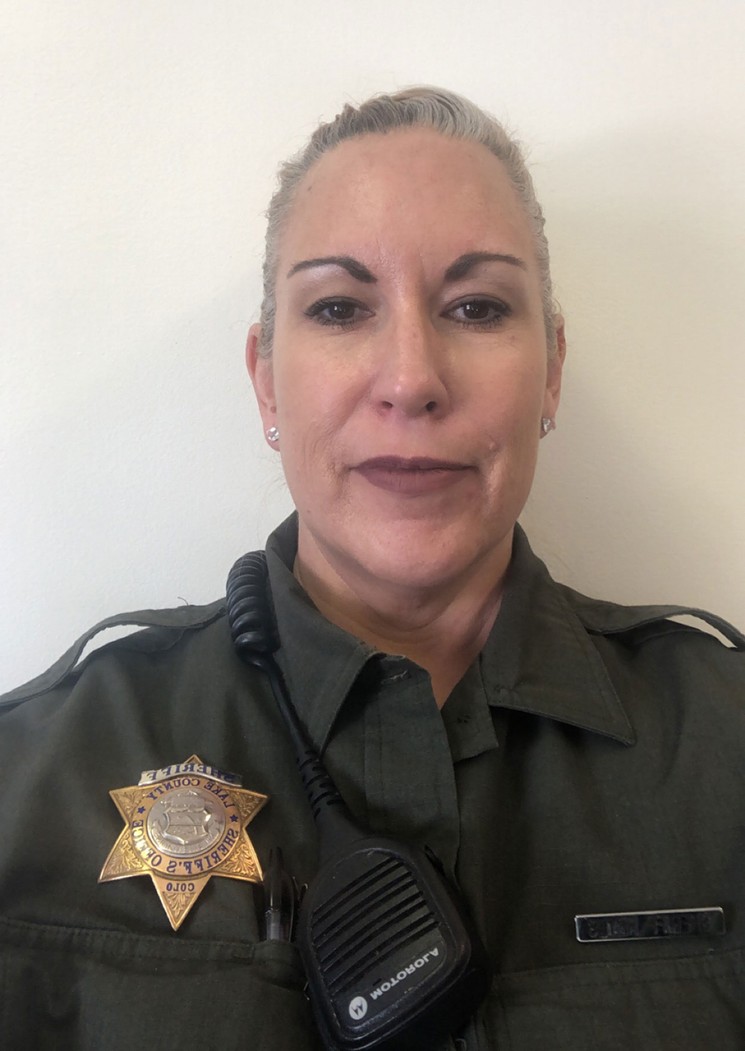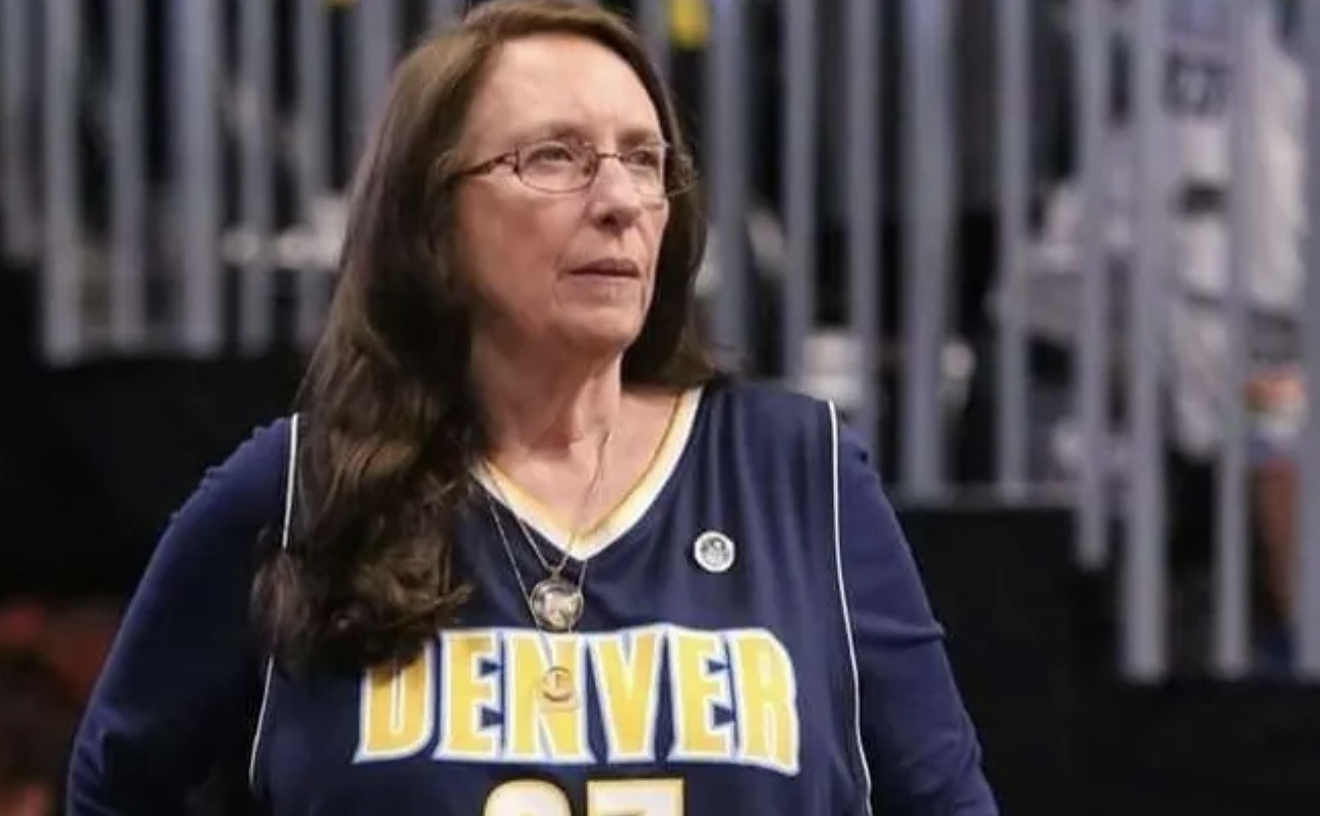That same week, Mendoza walked into Garner’s house, gun drawn. “I just wanted to protect you,” Mendoza told Garner, explaining that he’d just seen a strange car in her driveway. The vehicle belonged to her cousin, who had just driven her home from the hospital.
It was not the first time that Mendoza had shown up at Garner’s house unannounced, nor would it be the last. “It was his way of showing me that he was watching me,” says Garner.
Nor was Garner the only dispatcher in the Lake County Sheriff’s Office harassed by Mendoza. He would isolate Maria Chavez for uniform inspections, checking the back of her pants for creases; once, after he encountered Chavez in the break room, he texted her to thank her for the “eye candy.” He would ask Chelsa Parsons about her shower routine as he smelled her hair and tickled her torso. Mendoza often posted questions to the dispatchers about their sex lives, bemoaning his older age; when Parsons seemed uncomfortable with his line of questioning, he would prod her to answer in a yes/no format.
One day, when Garner showed up at the office feeling under the weather, Mendoza asked if she was sick “because she was sucking too much dick.” Another time, when she tried on a new uniform, he told the dispatcher that “her tits looked 3-D.” Members of the LCSO command staff, who were sometimes present during these incidents, ignored them or even laughed at Mendoza’s actions, the dispatchers say.
Garner, Chavez and Parsons needed their jobs, which aren’t easy to come by in Leadville, the only sizable municipality in Lake County. They share a history of domestic violence; they each have children to feed. And they all believed in the inherent value of their work as LCSO dispatchers. “I thought I got the job because I earned it,” Parsons says. “I question that now. I think he saw me as a victim. He saw all of us as easy prey.”
But if Mendoza viewed the women as easy prey, he underestimated them. Complaints by the dispatchers, along with Mendoza’s former stepdaughter, set off a chain of events that rocked the historic mining town to its core. In criminal and civil proceedings, and, perhaps most powerfully, in the court of public opinion, the women exposed the LCSO’s misogynistic culture, ultimately stripping the undersheriff of his job and Sheriff Rod Fenske of his reputation.
Today, in a crowning irony, the LCSO is headed by a woman who was herself a victim of domestic violence: Lake County’s first female sheriff — and only the second in Colorado.
When Rod Fenske was elected sheriff of Lake County in 2010, he had worked for the Leadville Police Department for over 25 years. Mendoza, who had worked at the department alongside Fenske, was hired as LCSO undersheriff the day Fenske took office. The following years were rough for Lake County’s law enforcement agencies. In 2014, two LCSO employees were indicted in connection with illegal-gun transactions and later found guilty of embezzlement of public property and official misconduct. In 2015, Leadville Chief of Police Michael Leake, the man who had first recruited Mendoza, resigned from the department after getting two DUIs. Soon after, he was charged with fourteen felonies, most of which involved pawning LPD firearms along the Front Range; he wound up taking a plea bargain. In 2017, an LCSO deputy resigned after he was issued a DUI by his own office.
In January 2017, Undersheriff Mendoza outlined some policies for office behavior. In an email titled “Last Warning,” Mendoza, who was widely considered a shoo-in for Lake County Sheriff once Fenske retired, addressed procedures for LCSO staffers with any complaints about the office: “If you have questions, comments or concerns about ANYTHING related to HR, finance, benefits, etc….you are to follow your chain of command which means you will go to your supervisor then ME.”
In Lake County, government officials can choose whether to funnel personnel matters through the Board of County Commissioners’ Human Resources Department or handle them internally. Though most agencies opted to use the BOCC’s services, the LCSO did not. And while the BOCC adopted a new personnel handbook for the county in 2014, the LCSO followed its own policy and procedure manual created within the office.
By October 2017, Garner couldn’t take it anymore. She’d worked for the LCSO for nearly a year, and the harassment was getting worse. Despite Mendoza’s email, she took her complaints to LCSO deputy John Padgett. “I knew he wouldn’t stand for it,” she recalls.
Padgett took Garner’s harassment claims, as well as those of the other dispatchers, to the Fifth Judicial District Attorney’s Office, which launched an investigation from its base in Breckenridge. (This story is based on that investigation, as well as interviews with the women who complained about Mendoza and the actual courtroom proceedings.)
“I thought I got the job because I earned it. I question that now. I think he saw me as a victim. He saw all of us as easy prey.”
tweet this
A month later, after the women shared their story with the media, Fenske finally started his own internal investigation, issuing a statement that Mendoza would be on administrative leave during the investigation. But according to the dispatchers, Mendoza continued to show up at the office unannounced. And after Lyons Gaddis, the Denver firm responsible for the internal investigation, determined that while Mendoza had indeed made inappropriate sexual innuendos to the LCSO staffers, particularly through text messages, they didn’t rise to the level reported by the dispatchers, Mendoza was allowed to resume work full-time. Fenske asked the women to sit down one-on-one with the undersheriff and “work it out.” They refused.
Finally, on November 20, 2017, seven weeks after Garner had first taken her harassment claims to Padgett, Mendoza was terminated from the LCSO. “There are other members of the agency affected by these women and their statements. When do they get a voice?” Mendoza asked.
Some of those members soon made their feelings known. Shortly after the undersheriff’s termination, Fenske, who’d declined to comment on Mendoza’s firing, walked into the dispatch office, a tiny room lit by a switchboard, while Parsons was working. Talking on his cell phone, he loudly declared that sexual harassment was a minor administrative issue and not against Colorado law, she recalls.
The sheriff instructed dispatch supervisor Mary Ann Hammer to send out an email instructing all LCSO staff to avoid the already isolated office. “Arrangements will be made to move the water cooler, coffee and refrigerator,” Hammer wrote. The new policies made it difficult for the dispatchers, who must provide 24/7 phone coverage, to take bathroom or lunch breaks. One deputy told Garner to wear a diaper when she asked him to cover the 911 phone so that she could go to the restroom; another told her to pee in a bottle. Fenske bought video surveillance equipment to keep tabs on the office, dispatchers said, though it was never installed.
Chavez had already left the LCSO in early November. “It felt like everyone turned their backs on us,” she wrote in her resignation letter. “I am ashamed and embarrassed with the fact that as law enforcement officers they are not respectful of victims.”
“It made us feel totally isolated, like we were just shoved in a cage,” recalls Garner, who started having panic attacks when she worked the night shift. She resigned a week after Mendoza’s termination.
“Firing Mendoza was just a Band-Aid on a large wound,” Garner wrote. “The lack of truthful information and openness from my chain of command has put me at a disadvantage, and I feel retaliation will continue.”
Continue it did. Throughout the winter, Garner reported receiving threatening mail, including a shredded LCSO tax form and notes calling her a “fat lying whore” and a “bitch.” One morning, she woke up to find a punctured tire on her vehicle. “I still look over my shoulder to this day,” she says.
But the dispatchers soon had support from an unexpected source: Mendoza’s former family.
In early November 2017, Autumn Roybal, Mendoza’s 22-year-old former stepdaughter, heard about the dispatchers’ claims on Facebook. She, too, was a victim of his bullying, sexist behavior.
“I saw how he wasn’t only using his position as a law enforcement officer against me; he used his power against others,” Roybal remembers. “I couldn’t let him get away with it anymore.”
With the support of her mother, Nicole Lassman, and sister, Roybal drove to Breckenridge, where she met with Jason Boston, an investigator with the DA’s office. Paula Velasquez, the LCSO’s administrative assistant and a longtime friend of the family, joined them. During hours of recorded interviews, Roybal recounted the living nightmare of her teenage years spent under the same roof as a victimizing stepfather.
Some days when Roybal returned home from Lake County High School, Mendoza would be sitting naked in a recliner in the family’s living room. More than once, he asked her to help him masturbate, she told the investigator. During her junior year, she found a video camera in her bedroom and, later, her bathroom. When she attempted to move the camera, Mendoza told her that he’d placed it in her room so that he could watch her change.
Roybal also showed Boston a series of text exchanges with Mendoza, messages that she’d archived in case she one day felt compelled to seek justice.
“Are you going to keep letting your hair grow down there?” Mendoza had asked at one point. “IDK,” she responded. “You should a little more that’s hot,” he wrote.
At other times, Mendoza asked Roybal for videos of her masturbating, to “drop her pants and take a selfie,” and whether the female friends she was hanging out with were naked. He called her “mama” throughout the texts and once sent a meme of an erect penis with the words “do you want to get huge like me...I’m finally ready to share my secret for free.”
“I saw how he wasn’t only using his position as a law enforcement officer against me; he used his power against others.”
tweet this
“He was supposed to be my dad,” Roybal says. “He was the only father figure I had at that time. … It’s hard to think why he would do that to me. He told me if I told anyone that he would take me away from my mom.”
One night when the family was together at home, Roybal’s mother saw a text from Mendoza flash across her daughter’s phone. She grabbed it, confused as to why Mendoza, who was sitting in the same room, would be texting her youngest daughter. The further back in Roybal’s text history Lassman scrolled, the more horrified she became.
“I haven’t done anything criminal,” Lassman remembers Mendoza saying when she confronted him that night. “I’m a trained liar; I can beat any polygraph.”
Lassman promptly dissolved their common-law marriage and moved with Roybal to the Front Range, where the two still live.
Although Lassman and Roybal had moved out years before, the DA’s office thought it had a case. On December 12, 2017, Mendoza was indicted by a grand jury and taken into custody, a prisoner in the jail he’d once supervised. The following day, Mendoza, in shackles and an orange-and-white-striped jumpsuit, was escorted into Lake County District Court by a former co-worker. “I knew within my heart that my story was just the tip of the iceberg,” recalls Garner, who was sitting in the front row.
The former undersheriff was advised that he was being charged with attempt to commit first-degree aggravated incest, attempted sexual exploitation of a child, contributing to the delinquency of a minor, attempt to commit invasion of privacy for sexual gratification, embezzlement of public property (the prosecution alleged that Mendoza had stolen the video camera Roybal found in her room from LCSO) and two counts of second-degree official misconduct: five felonies and two misdemeanors in total. His bond was set at $100,000, and the judge issued protective orders for seven female victims, including the three dispatchers who’d complained about Mendoza.
This past August, Mendoza returned to court with John Scott, an attorney with the Alternate Defense Counsel, a state-funded agency that provides legal representation for indigent persons. Scott requested that the felony counts, which all involved Mendoza’s relationship with Roybal, be separated from the misdemeanors, which stemmed from the dispatchers’ allegations. Fifth Judicial Judge Karen Romeo, who would oversee Mendoza’s trial months later, granted the defense’s request, citing different time frames and alleged victims.
While Mendoza’s case moved through the courts, the shakeout continued at the LCSO...and beyond.
Padgett, the deputy who’d taken the dispatchers’ complaints to the DA, announced that he was running for sheriff. When the local newspaper, the Herald Democrat, asked what he would provide as sheriff, he responded with a clear dig at Fenske and Acting Undersheriff Bill Kirkland: “Equitable and competent leadership. Fair and capable leadership breeds fair and capable deputies.”
Padgett was defeated in the Democratic primary by Amy Reyes, a Lake County School District behavioral health prevention specialist and part-time Leadville police officer. Reyes had started her law enforcement career at the LCSO eighteen years earlier, later moving to La Junta to complete her master’s degree in psychology and work at the Otero County Sheriff’s Office. The mother of five had recently returned to Leadville to raise her two adopted sons.
Reyes entered the general election alongside four men: Kirkland, Leadville Chief of Police Rob Glenny, a former Climax Mine security officer and a private detective. But Reyes’s gender was not the only reason she stood out from the crowd: She spoke to voters, in English and Spanish, about her days as a teenage mom in California and how her experience as a domestic-violence victim inspired her to become a cop. “I decided I was never going to be vulnerable like that again,” she said.
Reyes promised transparency, as well as bilingual inclusion for Lake County’s large Hispanic community, a holistic view of mental health, and better collaboration with the Leadville Police Department. And she vowed to spearhead a change in the LCSO’s culture. When Kirkland insisted at a local debate that “our culture has changed...we’ve made mission impossible occur,” Garner, who was in the audience, exited the building in disgust.
She wasn’t the only one to disagree with Kirkland. “I personally have had a front row seat to the way law enforcement is handled in Lake County,” LCSO administrative assistant Velasquez wrote on Facebook a few weeks before the election. “Right now, the sheriff’s office is like an egg. It looks good on the outside, but when you crack it open, it is rotten.”
On November 7, Lake County citizens showed up at the polls to vote Reyes into office. The first female sheriff of Lake County celebrated her victory alongside her family, Padgett and other supporters at the county courthouse. “Ego has run this department for a while… . I know who I am, and I don’t need to continue that trend,” Reyes said. Fenske was nowhere in sight.
A few weeks after the election, Fenske fired Padgett and Velasquez, the only employees left at the LCSO who had publicly challenged the sheriff’s character and leadership capability. Fenske refused to release their personnel files and termination letters to the media.

Lake County law enforcement agencies have been rocked by scandals over the past several years.
Rachel Woolworth
Deputy District Attorney Johnny Lombardi opened the trial with an emotional appeal to the jurors. He recounted Roybal’s memories of Mendoza lying naked in the family’s recliner, the inappropriate texts, the video camera placed in her bedroom. Mendoza was a father figure who’d abused his position of trust, Lombardi said.
“The evidence will show a strange relationship between Roybal and Mendoza,” Scott responded during his opening statement. “Inappropriate, yes, but not criminal.”
During hours of testimony and cross-examination, Roybal sometimes struggled to pinpoint time frames, numbers and the details of her interview with Boston. Screenshots of Mendoza’s texts seemed to corroborate her testimony, though they were all sent after she’d turned eighteen and was no longer a minor.
After Roybal left the stand, the jury heard from an LCSO employee who described Mendoza’s bursts of anger at work, and from other former co-workers who talked about LCSO’s video cameras, one of which the prosecution claimed Mendoza had embezzled to film Roybal.
When Boston took the stand, Scott sharply questioned him about his prior professional experience, the group setting of Roybal’s interview in Breckenridge, and Boston’s failure to examine LCSO’s video cameras in person.
The following morning, the defense asked that all charges be dismissed because of insufficient evidence. Judge Romeo dropped the charge of contributing to the delinquency of a minor and reduced the charge of invasion of privacy for sexual gratification, from a felony to a Class Two misdemeanor.
“The secret has been told,” Lombardi said in his closing statement. “The secret you heard from the witness stand, from Autumn Roybal, the secret that the defendant, the second-highest in command of Lake County law enforcement, wanted her to keep. Roybal was looking for a father figure in her life. Instead, she got a grown man who asked her to help him jack off.”
“Ms. Roybal’s testimony, quite honestly, was all over the place,” Scott countered. “Nothing corroborates her testimony. She’s saying whatever the DA wants her to say. Their role is to present proof, and they haven’t done it.”
“Rely on your common sense and your life experience. This type of crime doesn’t happen in public.”
tweet this
“Rely on your common sense and your life experience,” Assistant DA Heidi McCollum rebutted as she described a forty-something man with a badge, a gun and a temper. “This type of crime doesn’t happen in public.”
On December 10, almost a year after Mendoza was first indicted, a jury of five women and seven men found Mendoza guilty of attempted incest and invasion of privacy for sexual gratification. Sentencing was set for February 21.
Roybal and Lassman exited the courtroom and embraced each other, the dispatchers, Velasquez. “It’s hard to explain,” Roybal said of her emotions after hearing the verdict. “It just feels good...knowing I finally got justice.”
“I just want to thank the jury for seeing past him,” Lassman added, “for seeing that he’s not above the law.”
“It’s because of Autumn that I feel this was all worth it,” Garner said. “He can’t hurt her again.”
Eight days later, Garner, Chavez and Parsons filed suit against LCSO, the Board of County Commissioners, Mendoza, Fenske and Hammer in U.S. District Court. Represented by the firm of Rathod Mohamedbhai, the dispatchers are requesting unspecified damages for unlawful sex discrimination, retaliation and violations of their rights to free speech and equal protection under the First and Fourteenth amendments.
The lawsuit claims that both Mendoza and Fenske sexually harassed the women. In their suit, the dispatchers say that the former sheriff often blamed his bad moods on “not getting some before work,” gave them unwanted massages and made them listen to stories about the sexual escapades of his youth. After calling Chavez “sweetie” and “little girl,” Fenske acknowledged that he could get in trouble for his actions and warned her not to complain, the suit further charges. It also describes in detail alleged retaliation against the dispatchers.
“The Sheriff’s Office’s response to the complaints of sexual harassment by these brave women shows an utter depravity from the highest echelons of management down,” says attorney Iris Halpern, who’s handling the dispatchers’ case. “If that’s the response to a crime of sexual abuse or harassment that the community can expect from its officers, it’s a dark day, indeed.”
A month after the civil case was filed, Judge Romeo dismissed Mendoza’s remaining two counts of second-degree official misconduct that had stemmed from the dispatchers’ allegations. Those charges were based on the idea that the then-undersheriff had “capriciously violated a statute or lawfully adopted rule or regulation relating to his office,” but Romeo now said that no evidence had been presented to the grand jury that the LCSO’s handbook had been officially adopted, and therefore she could not find probable cause that Mendoza had violated an official rule or regulation.
On January 8, Amy Reyes was sworn in before a cheering crowd.
Fenske’s supporters at the sheriff’s office had resigned in the days before she took office. The new sheriff was left with no advocate, two dispatchers, two deputies and three jailers. “On the surface, it looked like they were trying to help my transition,” Reyes says of the former regime. Yet as the sheriff looked closer, she realized that many personnel records and billing archives were gone and reports were left unfinished. After hours of searching, she found the deputies’ radios packed in a box that had been pushed to the back of a storage room and covered with other gear.
But Reyes soon had new, experienced staffers. After she took office, she called Garner, Parsons and Chavez. She told them she admired them, and asked them to return to the LCSO. “It’s not easy when you stand alone to make the right decision,” Reyes notes.
Garner, Chavez, Velasquez and Padgett are once again employees of the Lake County Sheriff’s Office. Under Reyes’s watch, they answer 911 calls, file incident reports, and patrol Lake County’s many roadways and neighborhoods.
“Being back with Nikki, Paula and Padgett is one of the best feelings I’ve ever experienced,” Chavez says. “I’m not coming into this space by myself, but with the people who understand every one of my emotions attached to this office.” Reyes’s support was key, she adds.
“Two-thousand eighteen was the lowest I’ve ever felt,” Garner adds. “To return to the office, alongside the others, it feels amazing. I feel overcome with love.”
A few weeks ago, Chavez texted Garner and Parsons a message that still resonates with the dispatchers: “God will put you together again in front of the people who broke you.”
At the close of Mendoza’s trial, McCollum had asked the jury: “Where’s the power? Did Roybal ever have power in this?”
On February 21, when Mendoza is sentenced, Roybal will see the power of her story, the justice that can result from of a victim speaking out. The dispatchers already understand their impact. They know that a call for help can come from anywhere. Even from within the sheriff’s office.

















